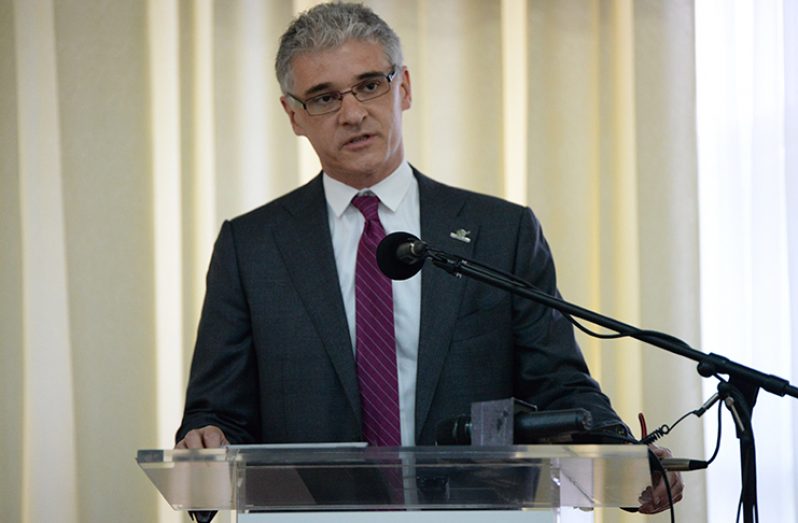-T&T energy chamber head urges local businesses
AS Guyana prepares to welcome the new oil and gas industry, local stakeholders would have to develop a robust culture of safety and become leaders in safety.
“If your objective is just to meet the requirements set by operators, you will fail. If your objective is to become a leader in safety and build a robust safety culture in your company then you will be able to meet the requirements,” said President and Chief Executive Officer (CEO) of the Energy Chamber of Trinidad and Tobago, Dr. Thackwray Driver, during his remarks at the Guyana Safety Forum at the Arthur Chung Convention Centre on Thursday.
In order for Guyana to experience sustained growth and develop a world class energy industry that benefits the local economy, it is critical for a robust safety culture to be adopted now.
Dr. Driver believes that it is imperative for Guyana to adopt safety systems and procedures that international operators consider basic to safe and productive operation.

“Adherence to such systems would also give locally owned and operated contractors greater access to work in the sector, which will enhance local content development,” he said, adding that it was with this in mind that the Guyana Safety Forum was conceptualised.
The forum was organised by the Energy Chamber of Trinidad and Tobago with a view of promoting knowledge transfer.
The issues addressed at the session were based on information on how contractors can implement a strong safety programme in a new hydrocarbon environment, so that they are able to access jobs with the multinationals.
Presenters from all sectors within the Guyanese, Trinidadian and International energy industry presented their perspective and shared their knowledge of how this can be achieved.
One of the major messages of the forum was that any emerging hydrocarbon industry should encourage the development of a group of well-qualified, experienced and ethical local professionals who would ensure that high standards of safety at all levels of operations is not just given lip service.
Dr. Driver believes that one of the barriers facing small contractors and service companies wanting to do business with international oil and gas companies is meeting the high safety, health and environmental standards that they demand from all their suppliers.
If a contractor or service company does not meet the operator’s health, safety and environmental (HSE) requirements, they will not even be able to bid for work.
Meeting these HSE requirements will not necessarily mean the bidder will win business but, he said they must also meet all the technical requirements and be competitive on price.
“International operators are not going to lower their standards to accommodate local contractors. As leaders in the industry we have an obligation to make sure that every single one of the people, who come to work on any of our facility, goes home to their families in one piece at the end of each day,” said Dr. Driver.
Meeting the high safety standards of operating companies can, however, be a challenge in countries with new hydrocarbon industries, such as Guyana.
This is especially the case if the country does not have an existing well developed national legislative framework and a history of a strong safety culture in other sectors.
For most local companies in Guyana, the chamber’s president said meeting the high standards of international operator companies will involve a serious change.
“Guyana will need to develop a cadre of well-trained, seasoned and certified Guyanese HSE professionals who will discharge their responsibilities ethically and professionally,” said Dr. Driver, noting that leaders of the local private-sector will have to internalise a safety culture and understand that certification and safety cannot be bought.
“When Trinidad and Tobago was undergoing the rapid expansion of our gas industry in the early 2000s, we had a very weak legislative framework for safety. However, because of the long history of activity in the energy sector, we did have a reasonable well-developed safety culture within the energy sector, not stellar but not entirely absent,” Dr. Driver added.
The knowledge and experience in Trinidad and Tobago is also available to Guyana, within the framework of the Caribbean Single Market and Economy (CSME). The Energy Chamber expressed its full commitment to helping persons build the necessary cadre of HSE professionals and the supporting systems that you need to embark on your safety journey.



.jpg)








